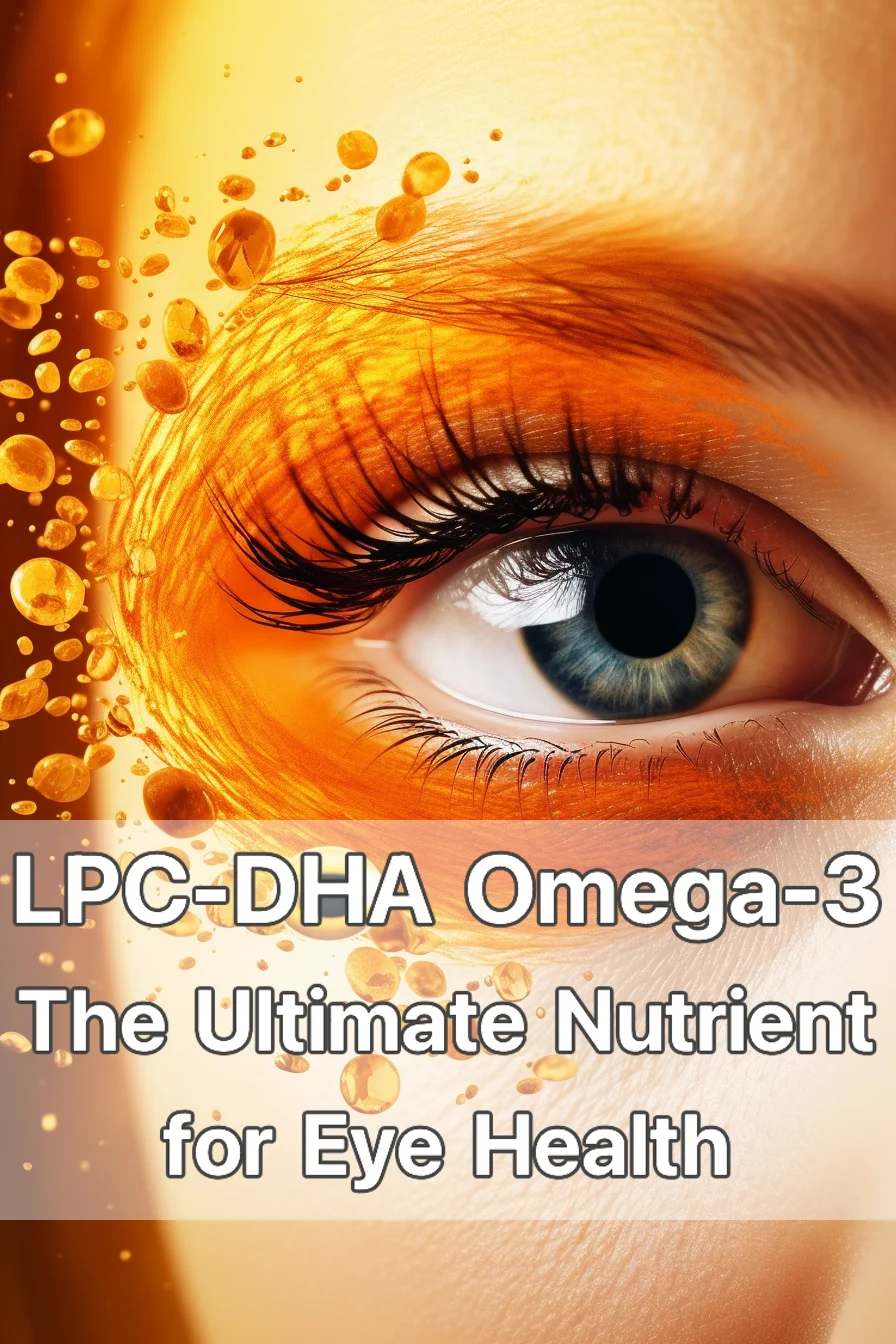 LPC-DHA Omega-3 Fatty Acids: TheUltimate Nutritional Powerhouse for Retinal Health
LPC-DHA Omega-3 Fatty Acids: TheUltimate Nutritional Powerhouse for Retinal Health
Omega-3 fatty acids have long been recognized for their numerous health benefits, with recent research uncovering even more advantages. One particular omega-3 fatty acid, lysophosphatidylcholine-docosahexaenoic acid (LPC-DHA), is making waves in the world of retinal health.
This powerful nutrient has shown promising results in providing support for those suffering from retinal diseases, making it an essential addition to a balanced diet. In this blog post, we will delve into the world of LPC-DHA, exploring its sources, nutritional benefits, and its crucial role in promoting retinal health.
What is LPC-DHA Omega-3 Fatty Acid?
LPC-DHA is a type of omega-3 fatty acid that has been gaining attention for its potential role in retinal health. Omega-3 fatty acids are a group of polyunsaturated fats that play essential roles in various bodily functions, including cell membrane function, brain health, and inflammation regulation. LPC-DHA, in particular, is a highly bioavailable form of docosahexaenoic acid (DHA), meaning it can be easily absorbed and utilized by the body.
Sources of LPC-DHA Omega-3 Fatty Acids
Finding natural sources of LPC-DHA can be challenging, as it is not as abundant in the typical diet as other omega-3 fatty acids. However, with some research and planning, you can incorporate LPC-DHA-rich foods into your meals. Some of the best sources of LPC-DHA include:
- Fish and seafood: Fatty fish like salmon, mackerel, black cod, and sardines are rich in omega-3 fatty acids, including LPC-DHA. Consuming two to three servings of these fish per week can help you meet your LPC-DHA requirements. Fish roe (eggs) are particularly rich in LPC-DHA, so you might want to add these to your diet.
- Krill oil: Krill oil is derived from small, shrimp-like crustaceans called krill. It is an excellent source of LPC-DHA, as well as other omega-3 fatty acids. Krill oil supplements are available and can be a convenient way to increase your LPC-DHA intake.
- Algae-based supplements: Algae-based omega-3 supplements, like those derived from Schizochytrium sp., are an excellent source of LPC-DHA for vegetarians and vegans. These supplements provide a sustainable, plant-based alternative to fish oil.
- Fortified foods: Some manufacturers are now fortifying their products with LPC-DHA, making it easier for consumers to meet their daily requirements. Look for fortified eggs, milk, yogurt, and other dairy products in your grocery store.
 Nutritional Benefits of LPC-DHA Omega-3 Fatty Acids
Nutritional Benefits of LPC-DHA Omega-3 Fatty Acids
LPC-DHA offers a multitude of health benefits, making it a vital addition to any well-rounded diet. Some of the key nutritional advantages of LPC-DHA include:
- Brain health: DHA is an essential component of brain cell membranes, playing a crucial role in maintaining brain function and promoting cognitive health. Studies have shown that a higher intake of LPC-DHA is associated with better memory and cognitive performance.
- Heart health: Omega-3 fatty acids, including LPC-DHA, are known to support heart health by reducing inflammation, lowering triglyceride levels, and improving blood vessel function. Regular consumption of LPC-DHA has been linked to a reduced risk of cardiovascular diseases, such as heart attacks and strokes.
- Anti-inflammatory properties: Chronic inflammation is associated with various health issues, including autoimmune disorders and cardiovascular diseases. LPC-DHA possesses powerful anti-inflammatory properties, helping to alleviate inflammation in the body and promote overall health.
- Mental health: Research has found that LPC-DHA may have a positive impact on mental health, particularly in reducing symptoms of depression and anxiety. By supporting healthy brain function, LPC-DHA can contribute to improved mood and emotional well-being.
- Eye health: DHA is a major structural component of the retina, making it essential for maintaining proper eye function. Consuming adequate amounts of LPC-DHA can help prevent age-related vision loss and other retinal disorders.
Benefits of LPC-DHA for People with Retinal Diseases
New research suggests that increased consumption LPC-DHA resulted in a 100% increase in the amount of DHA found in their retinas. Researchers found it to be superior to other forms of DHA supplementation such as fish oil and krill oil.
For individuals suffering from retinal diseases, LPC-DHA can offer additional benefits, making it an essential nutrient to consider. Some of the key benefits for people with retinal disorders include:
- Support for retinal function: LPC-DHA is vital for maintaining the structural integrity of the retina, playing a critical role in photoreceptor function and overall retinal health. By incorporating LPC-DHA into your diet, you can help support retinal function and reduce the risk of further complications.
- Protection against age-related macular degeneration (AMD): AMD is a common cause of vision loss in older adults, and studies have shown that a higher intake of LPC-DHA can help reduce the risk of developing this condition. The anti-inflammatory properties of LPC-DHA may also help slow the progression of AMD, preserving vision for a longer period.
- Potential benefits for retinitis pigmentosa (RP): While more research is needed, preliminary findings suggest that LPC-DHA supplementation may benefit individuals with RP, a genetic disorder that causes progressive vision loss. Early studies indicate that LPC-DHA may help slow the progression of retinal degeneration in RP patients.
- Enhanced neuroprotection: Retinal diseases are often associated with the loss of retinal neurons, leading to vision impairment. LPC-DHA has been shown to offer neuroprotective effects, safeguarding retinal neurons from damage and promoting their survival.
Conclusion:
LPC-DHA omega-3 fatty acids are a vital nutrient for overall health, with particular benefits for individuals suffering from retinal diseases. By incorporating LPC-DHA-rich foods into your diet, you can support your retinal health, prevent vision loss, and improve your overall well-being.
To ensure you’re getting the most out of this powerful nutrient, consider speaking with a healthcare professional or a registered dietitian for personalized advice on how to optimize your LPC-DHA intake.

LPC-DHA Omega-3 Fatty Acids: The Ultimate Nutritional Powerhouse for Eye Health

 LPC-DHA Omega-3 Fatty Acids: TheUltimate Nutritional Powerhouse for Retinal Health
LPC-DHA Omega-3 Fatty Acids: TheUltimate Nutritional Powerhouse for Retinal Health